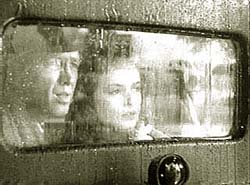DJay's got a problem. As if weren't hard enough being a small-time dealer and Memphis pimp to a skinny white girl, a stripper, and a pregnant heart-of-gold 'ho, he's got dreams. When you pull back the just-right tone of seedy Tennessee, this is a story about work and hope. If you've ever been one thing "but really" something else - actuary/extreme snowboarder, 7-11 night manager/poet - this movie is irresistable. I'm one of those. [Spoilers follow.]
Writer and director Craig Brewer lets DJay (Terrence Dashon Howard) off easy and often. It's why we like DJay. And it's why we think he's sure to fail. Though the first rap song he pens is Beat that Bitch - or softened for ready airplay, Whoop dat Ho - when one of his girls verbally emasculates him and threatens to take whip hand in the household, he throws her out without a whoopin'. DJay gathers around him, thanks largely to coincidence, a handful of talented wannabes and Big Opportunities. Skinny Black, a hometown boy made bad in the rap world, is coming to town. They overcome obstacles to cut a cassette (?) dub of a couple original songs, including You Know It's Hard Out Here for Pimp. Bad wages, poor working conditions, and adversarial labor relations. All that makes pimping hard, but what's at stake if DJay fails? When the power meeting with Skinny goes south, and DJay goes to prison, it is of course, his peeps who bring their collective dream alive.
What's great about the story is the way DJay becomes the designated hope-ster. Nola (Taryn Manning) wants some vague other thing in a future that's better than tricking under the train bridge. Key/Clyde (Anthony Anderson) wants to do original work that has feeling. Contrast this with recording court testimony. Shelby, on percussion and keyboard (DJ Qualls), wants to do other than service vending machines. Nola says it sounds worse than her job. And Shug (Taraji P. Henson), his longtime, wide-eyed, pregnant whore, wants simply to believe in something good for the baby she's about to give birth to. And they all pile on for the ride.
As a parable about believing, and achieving, a dream, Hustle and Flow preaches that it takes a lot of people to give a dream a pulse. If it's a parable about movie-making, then the movie is a shout-out saying that sacrifices must be made, flesh peddled, dreams retailed, drugs purveyed, and in the end fine-tuned talk transforms a thought into an entertainment. And that it's worth it.
skip to main |
skip to sidebar

Yes, we have RSS feeds!


A hard look at stories to learn about writing movies

Yes, we have RSS feeds!
Principles
It all started with, "I could write a movie that bad." Turns out, even that's hard. So...
- Appreciate what's admirable.
- Identify what's slack; examine why.
- Think fast and publish quickly because writing stories, not blogging, is the real deal.
Affirmations (or "Get off your ass!")
Luck is opportunity plus preparation plus luck. - Jane Espenson ~~ Don't let better be the enemy of good. - John August ~~ The business must eat stories. Don't wait. - Eric Jacobson ~~ The screenplay is a container for money. - John David Roberts ~~ Things are OK when the things you complain about are the things you used to dream about. - Aaron Sorkin
About Me

- John David Roberts
- I'm an experienced learning and OD professional, who's onto the what's new in learning, and in my few hours of spare time I write screenplays.
Seen and Read, 2007 (Screenwriter)
- Jimmy the Gent (Bertram Milhauser)
- To Be or Not to Be (Edwin Justus Mayer)
- The Cabinet of Dr. Caligari (1962, Robert Bloch)
- Notorious (Ben Hecht)
- The Treasure of Sierra Madre (John Huston)
- Down in the Valley (David Jacobson)
- Daddy Long Legs (Henry Ephron, Phoebe Ephron, Jean Webster)
- The Bells of St Mary's (Leo McCarey, Dudley Nichols)
- The Bishop's Wife (Leonardo Bercovici, Charles Brackett, Robert E Sherwood, Billy Wilder)
- Atonement (Christopher Hampton)
- Breach (Adam Mazer, Wm. Rotko, Billy Ray)
- Charlie Wilson's War (Aaron Sorkin)
- Enchanted (Bill Kelly)
- Disturbia (Christopher B Landon, Carl Elsworth)
- Because I Said So (Karen Leigh Hopkins, Jessie Nelson)
- Freaks (Clarence Aaron Robbins)
- Hollywoodland (Peter Bernbaum)
- My Super Ex-Girlfriend (Don Payne)
- The Bourne Ultimatum (Tony Gilroy, Scott Z. Burns, George Nofli)
- Sicko (Michael Moore)
- Knocked Up (Judd Apatow)
- The Island (Caspian Tredwell-Owen, Roberto Orci and Alex Kurtzman)
- The Princess Bride (William Goldman)
- The Wizard of Oz (Noel Langley, Florence Ryerson, Edgar Allen Woolf)
- Ocean's Thirteen (Brian Koppelman, David Levien)
- Broken Flowers (Jim Jarmusch)
- Live Free or Die Hard (Mark Bomback)
- Local Hero (Bill Forsyth)
- Hot Fuzz (Edgar Wright, Simon Pegg)
- Shrek the Third (Andrew Adamson, Howard Gould, Jeffrey Price, Peter S. Seaman, J. David Stern, David N. Weiss, Jon Zack)
- One Crazy Summer (Savage Steve Holland)
- Severance (James Moran, Christopher Smith)
- The Science of Sleep (Michel Gondry)
- Spider Man 3 (Sam and Ivan Raimi, Alvin Sargent)
- The Lives of Others (Florian Henckel von Donnersmarck)
- Jesus Camp (Heidi Ewing, Rachel Grady, dirs.)
- The Holiday (Nancy Meyers)
- Stranger than Fiction (Zach Helm)
- On Broadway (Dave McLaughlin)
- The Pursuit of Happyness (Steve Conrad)
- The Namesake (Sooni Taraporevala)
- The Last King of Scotland (Jeremy Brock, Peter Morgan)
- The Devil Wears Prada (Aline Brosh McKenna)
- The Knack...and How to Get It (Charles Wood)
- Borat (Sacha Baron Cohen, Anthony Hines, Peter Baynham, Dan Mazer)
- The Departed ( William Monahan)
- Zodiac (James Vanderbilt)
- Children of Men (Alfonson Cuaron, Timothy Sexton, David Arata, Mark Fergus, Hawk Otsby)
- The Chronicles of Narnia (Ann Peacock, Andrew Adamson, Christopher Markus, Stephen McFeely)
- The Incredibles (Brad Bird)
- The Goonies (Chris Columbus)
- Letters from Iwo Jima (Iris Yamashita)
- Flags of Our Fathers (Wm. Broyles Jr., Paul Haggis)
- Night at the Museum (Ben Garant, Thomas Lennon)
- Notes on a Scandal (Patrick Marber)
- Man on Fire (Brian Helgeland)
- Pan's Labyrinth (Guillermo del Toro)
- The Painted Veil (Ron Nyswaner)
- Babel (Guillermo Arriaga)
- Blood Diamond (Charles Leavitt)
- The Queen (Peter Morgan)
Screenwriting Bloggers
Labels
- blog news (2)
- comedy (2)
- 2008 awards (1)
- Apatow (1)
- Bateman (1)
- Bill Forsyth (1)
- Bill Kelly (1)
- Christmas (1)
- Dan in Real Life (1)
- Die Hard (1)
- Disturbia (1)
- Enchanted (1)
- Gondry (1)
- Heigl (1)
- Hot Fuzz (1)
- Mira Nair (1)
- Paul Fieg (1)
- Peter Hedges (1)
- Rear Window (1)
- Rogen (1)
- Tambor (1)
- airport (1)
- character (1)
- dream (1)
- genre update (1)
- goal (1)
- heroes (1)
- horror (1)
- ignorance (1)
- irony (1)
- parallel story (1)
- sincerity (1)
- slasher (1)
- sleep (1)
- story (1)
- thriller (1)
- town vs corp. (1)

No comments:
Post a Comment